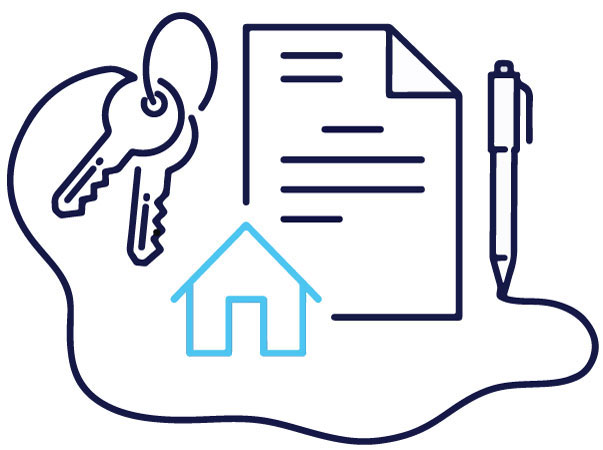Frequently Asked Questions
What is conveyancing?
Conveyancers are licensed professionals who ensure that all relevant legal documentation is checked, signed, and certified before the transfer of property from one party to another. A typical conveyancing transaction goes through two main phases: the exchange of contracts and final completion.
We take care of all the legal complexities and assist in the sale, lease, purchase, and transfer of commercial and residential properties.
Why do I need conveyancing?
Conveyancing is a necessary part of buying, selling, and transferring property or land. This process can get complicated fast, which is why you need the right advice and support. Our team are property law specialists and have all the necessary experience and skill to help you buy and sell property with ease, abiding completely by legislation.
How are conveyancing fees estimated?
Conveyancing fees are subject to variation based on a number of factors, including location, extent of search, different councils, and overall paperwork. Another added expense is the cost of lawyers and paralegals time.
Fortunately, we have control over this, which is why we offer a fixed flat fee even if things get complicated or unexpected issues arise. When you enlist the services of Entry Conveyancing, you receive peace of mind knowing that what was agreed upon financially will not change. This also allows you to better plan for the future, as you’ll be able to budget with confidence.
When should I engage a conveyancer for property transactions?
As soon as you’ve decided to buy, sell, or transfer property, you should contact a conveyancer immediately and set up a ‘pre-purchase contract review’. The quicker you start, the more control you have over the situation at hand. It’ll also make the conveyancers’ life easier, as they have much more time to work on and prepare any necessary legal documentation.
What do conveyancers search for when evaluating property?
Conveyancers conduct searches of properties to help the buyer evaluate the property before final purchase. These searches identify any potential legal, property or ownership issues. If the building has the relevant approvals, if it has heritage lists or if there are any issues over the title. These searches are also done to make sure any debts in land tax or other rates are present or if they’ll be remediated before settlement.
If you have any special requirements for the property, let us know so that we can search the property with these issues in mind. Given our experience in the industry and conveyancing expertise, we’ll be able to advise you on whether you should purchase the property.
However, to conduct specific searches, special conditions will have to be present in the contract to allow for different types of searches. If these special conditions are not present, you may not be able to terminate the agreement based on findings from the investigation.
What is the difference between a conveyancer and a lawyer?
It’s easy to get confused by the difference between conveyancers and lawyers. While both occupations are qualified to act for you in a conveyancing transaction, just what are the differences?
Conveyancers are licensed to operate in only one aspect of property law: conveyancing. As such, it is common that conveyancers possess much more specialised skills, given it’s the only thing they focus on. There’s also less chance of a conveyancer being out of the office or in the courts dealing with other issues. Conveyancers are only responsible for making sure you meet every legal obligation involved in your property transaction.
In contrast to lawyers, conveyancers cannot advise on areas of the law outside of conveyancing. If you need general legal advice, conveyancers will refer you to a qualified lawyer. Lawyers are trained to advise clients on their legal rights and obligations and represent them in the courts across various issues.
Typically, conveyancers have more substantial knowledge regarding the rules and regulations of conveyancing and property, as this is their only area of specialty. Lawyers are more of a general practitioner with knowledge in the area that isn’t as in-depth.
What is an “off-the-plan” purchase?
An “off-the-plan” purchase involves a plot of land that has not yet been divided or a property that does not exist physically and instead only resides on an approved or proposed plan.
For example, suppose someone has a large paddock and wants to subdivide it into smaller plots. In that case, they may sell the divided blocks in theory and then separate them later once they know that people are interested in purchasing them. This strategy minimises risk for the seller.
In this scenario, it should be noted that a vendor typically has 18 months to 3 years to sub-divide the land. If not, purchasers get their money back. Purchasers will select the blocks of land they want off the plan.
Off the plan purchases are extremely common for apartments, especially when new skyrise buildings are built. This can be risky in some cases, as there is potential for the buyer to be dissatisfied with the completed property’s appearance of liveability.
Should I have the contract and Section 32 checked before I buy?
It is crucial to have your contract and Section 32 checked before you purchase any type of property.
At Entry Conveyancing, our pre-purchase legal advice allows you to navigate the many ups and downs of buying, selling, and transferring property with more confidence. Too many people fail to receive conveyancing or legal advice from a qualified professional before purchase, which can unfortunately lead to substantial financial issues later on in life.
If you’re in the early stages of purchasing, selling, or transferring property ownership, call us on 1800 518 187 for a free consultation and quote. Our fixed fee rates also remove the possibility of being charged. Our conveyancing lawyers are here to help you navigate the stresses of property ownership, and you’re our only priority.
What happens at settlement?
Property settlement is the legal process necessary for the transfer of ownership from one party to another. Buyers, sellers, solicitors, and banks are all involved at settlement.
The length of the settlement process varies from state to state and property to property; however, as a rough guide, it typically takes anywhere from 30 to 90 days.
On settlement day, the purchasers’ bank will provide the funds needed to purchase the property to the buyers’ agent or solicitor, and in return, receive the Certificate of Title from the seller’s bank. Keys can then be handed over to the purchaser, provided all other agreements listed in the contracts have been met. From here, the buyer’s bank registers the relevant documentation and mortgage, notifying services such as electricity and water of the change.
What is “gazumping”?
Gazumping occurs when a seller accepts a verbal offer on the property from one potential buyer but then reneges and accepts a higher offer from another party.
In Australia, it is assumed that a purchaser understands that a sale has not taken place until all involved parties have fully executed the contract and that a purchaser who claims to have “been gazumped” has merely failed to understand the law.
To prevent yourself from being gazumped on a property, we recommend formalising a written contract agreement with your offer as soon as possible.
What is a cooling-off period, and how long is it?
A cooling-off period is an interval during which both sides of the transaction can cancel the contract and ‘walk away’ from the purchase without incurring a penalty.
Cooling-off period regulations and length differ from state to state. However, in Victoria, the cooling-off period lasts for three days and begins as soon as the buyer signs the contract, even if the seller hasn’t.
This is why we recommend buyers undergo a detailed review of their contract, making sure they’re happy with the terms before the final agreement or the cooling-off period. Conveyancing offers superb insight and advice regarding property contracts and final sale actions, allowing you to navigate the often-difficult nature of legal jargon and property contracts with ease.
If I sell my house without the intervention of a real estate agent, do I still need a conveyancer?
Yes. Property cannot be listed on the market or advertised before a proposed contract for sale has been prepared. Anyone who makes an enquiry or offers a property is entitled to ask for a proposed contract for sale. Failure to do so can result in fines.





